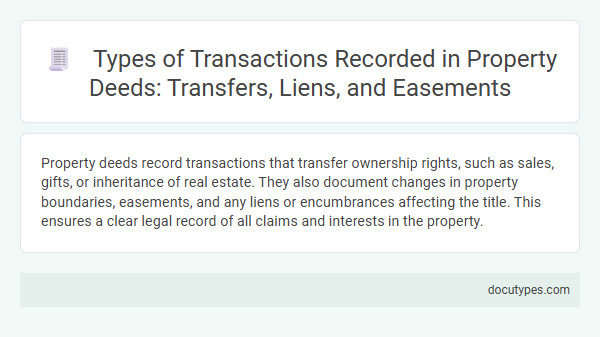Property deeds record transactions that transfer ownership rights, such as sales, gifts, or inheritance of real estate. They also document changes in property boundaries, easements, and any liens or encumbrances affecting the title. This ensures a clear legal record of all claims and interests in the property.
Introduction to Property Deeds
Property deeds are essential legal documents that record ownership and conveyance of real estate. They serve as official proof of property rights and ensure clear titles for all parties involved.
- Sale Transactions - Property deeds document the transfer of ownership when a property is bought or sold, detailing the buyer and seller's information.
- Gift or Inheritance Transfers - These deeds record property conveyed as a gift or passed down through inheritance, clarifying ownership succession.
- Mortgage and Lien Records - Deeds can include information about mortgages or liens placed on the property, protecting creditors and buyers alike.
Overview of Property Transactions
Property deeds record various types of transactions that legally define ownership and rights. These transactions include transfers, liens, and easements associated with the property.
Commonly recorded transactions involve the sale or transfer of ownership from one party to another, ensuring clear title. Liens, such as mortgages or tax claims, are documented to protect creditors' interests. Easements granting usage rights, like access or utility placement, are also noted to clarify property boundaries and obligations.
Types of Deed Transfers
| Type of Deed Transfer | Description |
|---|---|
| Warranty Deed | Transfers property with a guarantee that the title is clear and free of encumbrances. Protects the buyer against future claims. |
| Quitclaim Deed | Transfers whatever interest the grantor has in the property without warranties. Common in intra-family transfers or clearing title issues. |
| Special Purpose Deed | Includes deeds such as Sheriff's Deed or Executors Deed. These transfer property under specific legal circumstances or court orders. |
| Bargain and Sale Deed | Transfers property with implied ownership but no warranties against encumbrances. Often used in commercial transactions. |
| Grant Deed | Transfers property with limited warranties, mainly ensuring the grantor has not transferred the property to others previously. |
| Deed in Lieu of Foreclosure | Property transfer to lender to avoid foreclosure when the borrower is in default. The deed conveys full ownership to the lender. |
| Executor's or Administrator's Deed | Transfers property from an estate following probate. Represents ownership conveyed by an estate's representative. |
You should understand these types when reviewing property deeds to ensure your transactions are secure and properly documented.
Recording Ownership Transfer
Property deeds primarily record transactions involving the transfer of ownership from one party to another. These documents provide a legal record confirming the titleholder's rights to the property. When you buy or sell real estate, the deed ensures your ownership is officially documented and protected.
Understanding Property Liens
Property deeds document various transactions affecting ownership and legal claims. Understanding property liens is crucial for recognizing financial obligations attached to the property.
- Ownership Transfers - Deeds record the conveyance of property rights between parties, establishing legal ownership.
- Mortgage Liens - Mortgages create liens recorded on the deed, indicating lender claims until debt repayment.
- Mechanic's Liens - Contractors can place liens on property deeds for unpaid construction or repair work.
Your review of property deeds should include a thorough check for any liens that may impact your ownership rights or financial responsibilities.
Common Liens Found in Deeds
Property deeds document various transactions involving the ownership and interests in real estate. Common liens recorded in deeds include mortgages, tax liens, and mechanic's liens, which affect the property's title and encumbrances.
Mortgages are the most frequent liens, securing loan repayment to lenders. Tax liens arise from unpaid property taxes, while mechanic's liens protect contractors and suppliers for work performed on the property, ensuring you are aware of all financial obligations tied to the deed.
Easements Explained
Property deeds record various types of transactions that affect ownership and use of real estate, including easements. Easements grant specific rights to use a portion of your property for a particular purpose without transferring ownership.
- Easement Grant - This transaction documents the legal right given to another party to use part of your property for access or utilities.
- Easement Reservation - This occurs when a property owner retains specific usage rights over the land after selling the property.
- Easement Termination - This transaction officially ends an existing easement, removing the granted usage rights from the deed.
Recording Easements in Property Deeds
Property deeds record various types of transactions, including transfers of ownership, mortgages, and easements. Easements grant specific rights to use the property without transferring ownership, such as utility access or shared driveways.
Recording easements in property deeds ensures legal recognition and protects the rights of both property owners and easement holders. When you review a property deed, check for easements that may affect how the land can be used or accessed.
Legal Implications of Deed Transactions
Property deeds record various types of transactions including transfers of ownership, transfers of interest, and the establishment of liens or easements. These deeds create a legally binding record that affects property rights and obligations, influencing title clarity and future disputes. Understanding the legal implications of deed transactions is essential to protect your ownership rights and ensure accurate property records.
What Types of Transactions Are Recorded in Property Deeds? Infographic

